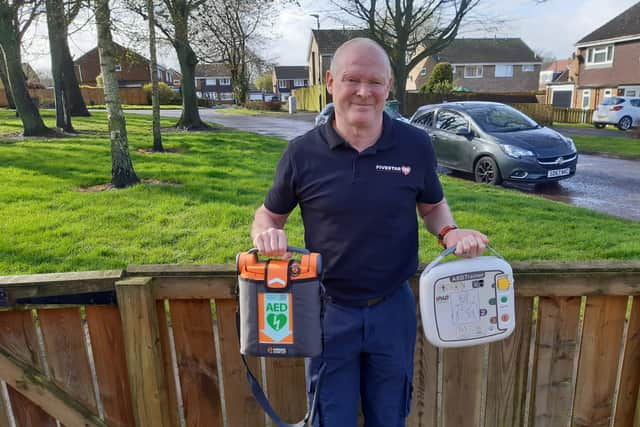Sunderland life-saver recalls the times he saved two lives as he looks to train others to do the same
This article contains affiliate links. We may earn a small commission on items purchased through this article, but that does not affect our editorial judgement.
and live on Freeview channel 276
Neville Harris, a retired nurse and former firefighter, used his life-saving skills many times in his professional life.
But it was two life-or-death incidents when he came to the rescue of members of the public that inspired him to make it his mission to ensure other people know how to react in similar situations.
Advertisement
Hide AdAdvertisement
Hide AdHe has now started up his own First Aid training provider, First Aid CPR, and is offering free classes to train people how to use defibrillators and administer cardiopulmonary resuscitation in an emergency situation.
Neville is often asked by people on his courses if he has ever had to use these vital skills in everyday life.


Recalling the first time, Neville, 59, said: “It was in 2019 and I was running in the Great North Run when I saw someone in front of me collapse and go into cardiac arrest.
“I stopped and started administering CPR until the ambulance arrived. The whole race was stopped and fortunately he regained consciousness, went to hospital and survived.”
Advertisement
Hide AdAdvertisement
Hide AdA second incident took place a few years later when Neville was playing football in Houghton.
He said: “I was asked to go along for a game of walking football. About 15 minutes in, a player on the opposite team collapsed. I went across to him and again, he looked like he was going into cardiac arrest.
“I started doing CPR while a couple of the other lads ran up to the leisure centre to see if they had a defibrillator - fortunately they did.
“He had three layers of tops on, and when I cut through the clothing I saw he had a scar where he had obviously had some form of heart surgery.
Advertisement
Hide AdAdvertisement
Hide Ad“I put the pads on and administered the shock. At that point there were still no signs of life. I started doing CPR again and suddenly his left arm shot up in the air.
“At this point, I checked and found his pulse. He then opened his eyes and started to come round.”
The man was taken to hospital, and once again survived due to Neville’s life saving exploits.
Despite this, Neville doesn’t consider his actions to be heroic.
Advertisement
Hide AdAdvertisement
Hide AdHe said: “I don’t consider myself a hero. I just knew what to do and was confident in that situation.”
Neville now wants to ensure other people are equipped and know what to do in similar life or death scenarios and is going to be running monthly sessions at Columbia Community Association Centre in Washington, teaching basic first aid, and in particular how to use a defibrillator and administer CPR.
He said: “I sometimes wonder what would happen if I was in that situation and would someone know what to do to save me.
“It’s vital people get this training because you never know when you could be put in a situation where you may have to respond and do something. People may not feel confident about how to react, but doing something is always better than doing nothing.”
Advertisement
Hide AdAdvertisement
Hide AdNeville has been part of a successful campaign to ensure every village in Washington has a defibrillator and he said there are now around 30 community defibrillators in the town.
However, having life-saving equipment on hand is only of benefit if people have the know-how and confidence to use it.
Neville said: “There is now a defibrillator outside the Victoria Inn pub. My friend was there when someone collapsed. He opened the defibrillator and wasn’t sure what to do with it. There were other people just standing around watching.
“He did his best, but sadly this person didn’t survive.”
In the North East there are 2,300 out of hospital cardiac arrests each year. Early cardiopulmonary resuscitation (CPR) and defibrillation can more than double the chances of survival. Every minute without CPR and defibrillation reduces the chance of survival by up to ten per cent.
Advertisement
Hide AdAdvertisement
Hide AdThe first training session will take place on April 22, with further free sessions planned every month thereafter.
To find out more or to register an interest, you can contact Neville via his Facebook page or by calling him on 07955154261.
Comment Guidelines
National World encourages reader discussion on our stories. User feedback, insights and back-and-forth exchanges add a rich layer of context to reporting. Please review our Community Guidelines before commenting.